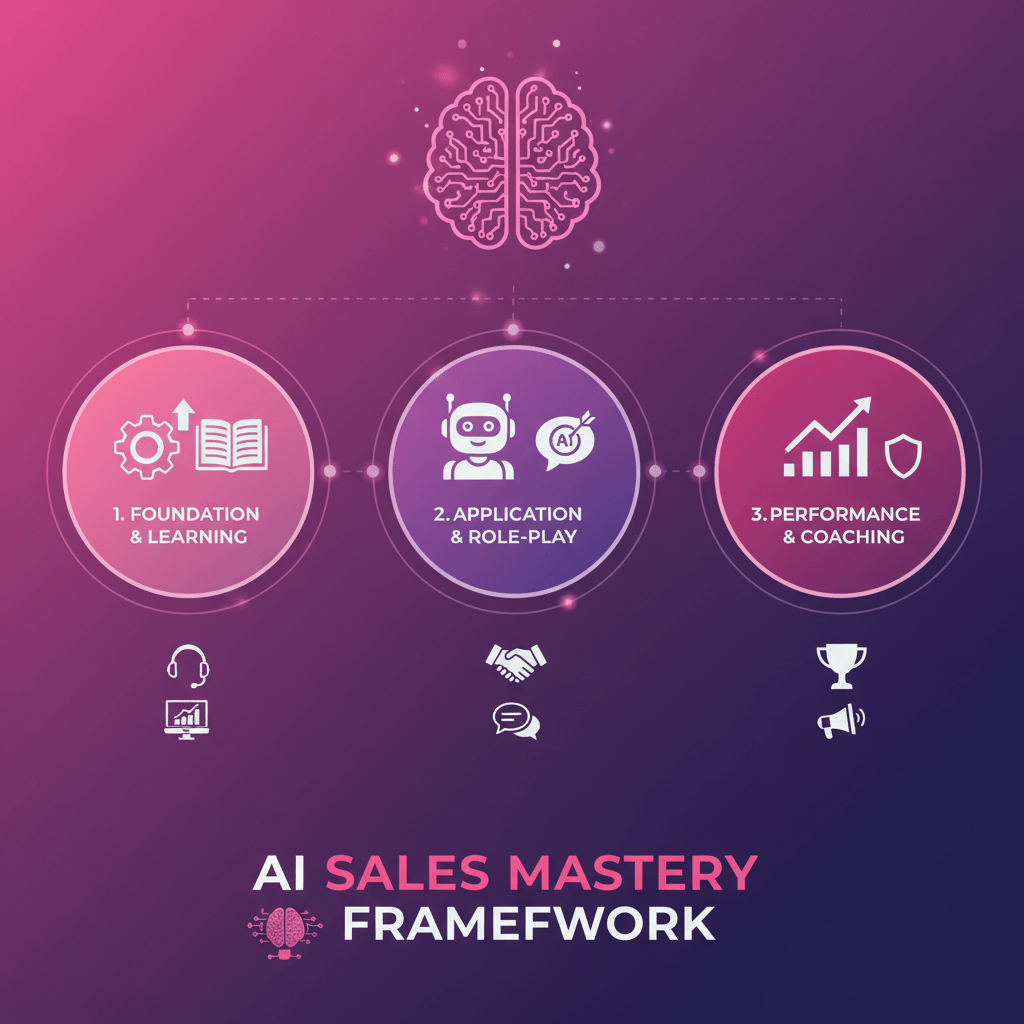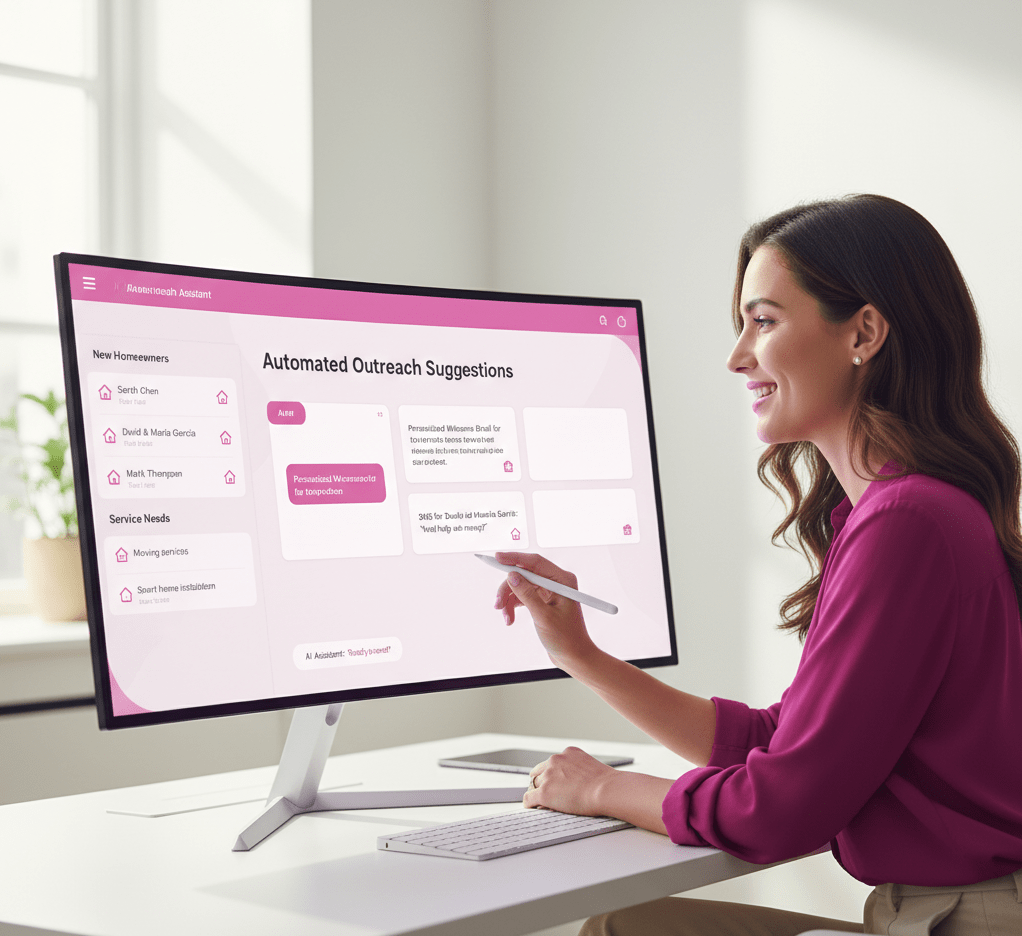“Managers must clearly teach how to train sales reps to use AI as a partner for lead qualification and scheduling.”
The sales landscape is changing fast. Technology, especially Artificial Intelligence, reshapes how we connect with customers. This isn’t just about new tools. It’s about a new way of working. Managers face a significant question: How do we prepare our sales representatives for this AI-powered future?
It’s not about replacing people. It’s about empowering them. AI isn’t here to take over. It’s here to be a partner. It’s an assistant. A powerful one. This guide will show you how to train your sales representatives to leverage AI effectively. You’ll learn to make AI a core part of their success. You’ll help them see AI as a way to do more. To close more deals. To be better at their jobs.

The Human Side of AI Adoption for Sales Teams
Bringing AI into sales isn’t just a tech project. It’s a people project. Your reps have questions. They might have fears. Will AI make their jobs obsolete? Will they look less valuable? These are real concerns. You need to address them head-on.
Change Management in Sales: A Proactive Approach
Resistance to change is natural. It’s human. Especially when jobs seem at stake. Your job as a manager is to lead this change. Don’t wait for problems to pop up. Be proactive.
First, explain why this is happening. Why are you bringing in AI? It’s not a secret. It’s a strategy. It’s about helping the team. It’s about growing the business. Emphasize the benefits for them. Less grunt work. More time selling. Better leads.
Second, involve them early. Don’t just announce a new AI tool. Talk about it. Ask for their input. What are their most significant pain points? How could AI help solve those? When people feel heard, they are more likely to buy into the idea.
Third, be transparent. What will AI do? What won’t it do? What will their role look like? Clear communication builds trust. Lack of it breeds rumors and fear.
Overcome Resistance to AI: Address Fears, Build Excitement
Fear often comes from the unknown. So, make it known. Show them what AI can do. Demonstrate it. Let them play with it. Think of it as a new teammate—a brilliant one.
Address the “replacement” fear directly. AI handles routine tasks. It sifts through data. It finds patterns. It qualifies leads. These are tasks that consume valuable time for sales representatives. Time they could be using to build relationships. To close deals. AI frees them up for the human touch. The persuasive conversations. The strategic thinking.
Build excitement by focusing on opportunity. AI gives them superpowers. They can manage more leads. They can focus on higher-value activities. They can get deeper insights into customer needs. It’s not about doing less. It’s about doing more impactful work. It’s about becoming a successful and strategic salesperson.
Reframe the Sales Role: Focus Reps on High-Value Tasks
The traditional sales role is changing. Many tasks that representatives once did can now be automated. This is good news. It means reps can spend more time where they add the most value—closing deals.
Sales Enablement for New Tools: A Shift in Focus
Your sales reps are good at connecting with people. They are good at persuasion. They are good at understanding needs. These are human skills. AI doesn’t have them. AI augments them.
Training should focus on this shift. How do reps move from prospecting to strategic engagement? How do they use the AI’s output? How do they leverage data?
What AI Handles (the “Pre-Sales” Work):
- Lead Generation: AI can scour databases to identify potential leads. It can find potential customers based on specific criteria. It can even identify buying signals.
- Lead Qualification: AI can analyze data points. It can score leads. It can identify which prospects are most likely to make a purchase. This means reps spend less time chasing cold leads.
- Initial Outreach: AI can personalize emails. It can send initial communications. It can even manage follow-up sequences. All to warm up a lead.
- Meeting Scheduling: AI can integrate with calendars to streamline the scheduling process. It can find suitable times. It can send invites. It automates the tedious back-and-forth.
- Data Analysis: AI can process vast amounts of customer data. It can spot trends. It can suggest the following best course of action. It can provide insights for personalization.
What Reps Now Focus On (High-Value Closing Activities):
- Building Relationships: This is where humans shine. Trust, rapport, empathy. AI can’t replace this.
- Deep Needs Discovery: While AI can provide initial insights, reps delve deeper. They ask probing questions. They uncover unspoken challenges.
- Solution Crafting: Reps tailor solutions. They present value. They show how the product solves specific problems.
- Negotiation: The art of negotiation requires human intuition. It needs adaptability. It calls for reading body language and tone.
- Closing Deals: This is the ultimate goal. The culmination of all efforts. The moment of commitment.
- Strategic Account Management: Nurturing existing clients, identifying expansion opportunities, and building long-term partnerships.
Think of it this way: AI is your team’s personal SDR. A super-efficient one. It does all the heavy lifting. It brings reps pre-qualified, warm meetings. Their job is to take those meetings and close them.
Integrate AI into Daily Workflow: Teach Reps to Manage AI Output
Making AI a seamless part of the daily routine is key. It shouldn’t feel like an extra burden. It should be a natural extension of their abilities.
Practical Training Guide for Managers: AI as a Sales Assistant
Your training needs to be hands-on. Show, don’t just tell. Break down how AI fits into their existing process.
Step 1: Introduction to the AI Tool (e.g., SalesCloser.ai)
- Walk-through: Start with a demo. Show them the interface. Explain what each feature does.
- “Why this tool?”: Reiterate the benefits. How will it make their lives easier? How will it help them hit their targets?
- Basic Navigation: Help them become comfortable navigating. Let them explore.
Step 2: Understanding AI-Generated Output
This is crucial. Reps need to understand what the AI provides.
- Pre-qualified Meetings: The AI sets these up. Explain what “pre-qualified” means in your context. What information does the AI gather about these prospects?
- Call Notes & Summaries: Many AI tools create detailed notes. Show them how to read these and quickly get up to speed before a call.
- Data Insights: The AI might flag key information. Buying signals. Customer pain points. Teach them how to interpret these.
Step 3: Managing the AI’s Output – A Strategic Approach
Reps don’t just accept what the AI gives them. They manage it. They direct it.
- Reviewing Meetings: Before a meeting, reps should review all AI-generated info. Prospect details. Previous interactions. What were the triggers for this meeting?
- Preparing for Calls: Use the AI’s data to tailor their approach. What questions should they ask? What solutions should they highlight?
- Giving Feedback to the AI (if applicable): Some AI tools learn from user input. Teach reps how to provide feedback. “This lead was great.” “This lead wasn’t a good fit.” This improves the AI over time.
- Directing the AI: Think of it like this: “AI, I need more leads like this.” “AI, focus on companies in this industry.” Reps should feel empowered to guide their AI assistant.
Step 4: Practice and Role-Playing
Learning by doing is most effective.
- Simulated Scenarios: Create mock scenarios. “The AI has scheduled this meeting. Here’s the data. Now, prepare for the call.”
- Role-Playing: Have reps practice their new process. One person is the rep, another is the manager providing feedback. Focus on how they integrate AI-provided information into their pitch.
- Shadowing: Have more experienced reps (who’ve embraced AI) shadow newer ones. Or, have managers shadow. Offer real-time coaching.
Modern Sales Training: Use AI-Gathered Data to Improve Performance
AI isn’t just about finding leads. It’s also a powerful tool for personal growth and self-improvement. It generates a ton of data. This data can help representatives become more effective.
Empower Reps with Technology: A Feedback Loop
Teach reps how to use this data. It’s not about micromanagement. It’s about personal growth.
- Call Transcripts and Recordings: Many AI tools record and transcribe calls. Show reps how to review their own calls. What went well? What could be improved? Did they miss a buying signal? Did they handle an objection effectively?
- Performance Metrics: AI can track key metrics. Conversion rates from AI-generated meetings. Time to close. Deal size. Help reps understand their individual performance not just against targets, but against their own past performance.
- Identifying Strengths and Weaknesses: The data highlights patterns. Is a rep great at discovery but struggles with closing? Is another excellent at objection handling? Use this data for targeted coaching.
- Personalized Coaching: Managers can utilize AI data to deliver targeted coaching. “On this call, the AI flagged a moment where the prospect mentioned budget concerns. How did you address that?” This is much more effective than general advice.
- Best Practices Sharing: When a rep has a particularly successful call that the AI transcribed, share it (with permission). Let others learn from their peers. This builds a learning culture.
Building a Tech-Enabled Sales Culture: Leading by Example
This isn’t just about training. It’s about culture. Managers must champion the use of AI.
- Lead by Example: If you don’t use the AI tools, your team won’t either. Show them you believe in it. Talk about its benefits.
- Regular Check-ins: Discuss AI in one-on-ones. “How are you finding the AI-generated leads?” “What insights did the AI give you this week?”
- Celebrate Successes: When a representative closes a deal that originated from an AI-qualified meeting, celebrate the achievement. Connect the dots. Show how AI contributed to the win.
- Foster Experimentation: Encourage reps to try new ways of working with the AI. What if they ask it to find leads with a specific niche problem? What if they try different ways of managing its output?
SalesCloser.ai: Your AI-Powered SDR Partner
Let’s look at a specific example: SalesCloser.ai. This tool is a prime example of how AI acts as a collaborative partner. It’s designed to give your reps perfectly teed-up, warm appointments. It turns AI into their personal, high-performance SDR. They manage it. They direct it. It empowers them.
How SalesCloser.ai Works with Your Reps:
Imagine SalesCloser.ai working in the background. It finds leads. It qualifies them. It reaches out. It nurtures. It books meetings directly onto your reps’ calendars.
- Seamless Calendar Integration: This is a game-changer—no more back-and-forth emails for scheduling. No more calendar clashes. SalesCloser.ai integrates directly with the rep’s calendar. It finds open slots. It books the meeting. It sends the invite. The rep simply shows up.
- Detailed Call Notes and Context: Before the meeting, SalesCloser.ai provides a comprehensive brief. This isn’t just a name and company. It includes:
- Prospect’s background: Industry, role, company size.
- Reason for the meeting: What triggered their interest? What problem are they trying to solve?
- Any prior interactions: Emails sent, content consumed.
- Key points of interest: What did the prospect mention that caught their attention?
- Suggested talking points: Based on the AI’s understanding, what should the rep focus on?
Turning AI into a Personal, High-Performance SDR:
With SalesCloser.ai, the AI is more than just a tool. It’s a team member.
- Reps Manage and Direct: Reps tell SalesCloser.ai what kind of prospects they want. “Find me decision-makers in manufacturing companies with 50-200 employees, who have downloaded our white paper on supply chain optimization.” The AI then goes to work.
- Focus on the Close: Reps get meetings with prospects who are already interested. They understand the problem. They’ve shown some level of engagement. This means reps can skip the cold outreach. They can dive straight into discovery and presentation of solutions. This boosts their confidence. It reduces burnout.
- Consistent Pipeline: SalesCloser.ai works 24/7. It constantly fills the reps’ calendars. This means a more predictable and consistent pipeline of opportunities. Reps are never scrambling for leads. They consistently engage with qualified prospects.
Consider this scenario: A sales rep checks their calendar in the morning. SalesCloser.ai books three new meetings. Each has a detailed briefing. The rep reviews the notes. They tailor their approach for each prospect. They go into the calls prepared, confident, and focused on closing. This is the power of working alongside AI. This is where modern sales thrive.
The role of a sales manager is evolving. It’s no longer just about managing people; it’s about managing people. It’s about managing people and technology. It’s about creating a synergy—a powerful partnership.
Your leadership in this transformation is critical. Embrace AI. Understand it. Then, teach your team to do the same. Show them how it makes them better. How does it make them more effective? How does it help them achieve their goals? The future of sales is collaborative. It’s human-led, AI-supported. It’s about maximizing human potential with innovative technology. Go forth and empower your sales team. Build them into an AI-powered selling machine. This isn’t just about better numbers. It’s about a better way to work. It’s about future-proofing your team and your business.
FAQs
Q1: Will AI replace my sales reps?
No, AI will not replace your sales reps. AI handles repetitive, data-heavy tasks. It focuses on lead generation, qualification, and initial outreach. This frees up your reps. They then focus on high-value human activities—skills such as building relationships, understanding complex needs, negotiating, and closing deals. AI is a partner, not a replacement.
Q2: What’s the biggest challenge in getting reps to use AI?
The biggest challenge is often resistance to change and fear of the unknown. Reps worry about their job security. They might feel overwhelmed by new technology. Managers must address these fears openly. Show them the benefits. Involve them in the process. Make the transition smooth.
Q3: How do I measure the success of AI in my sales team?
Measure success by examining key sales metrics and tracking improvements in lead quality. Look at conversion rates from AI-generated meetings. Observe changes in sales cycle length. Monitor deal size. Also, gather feedback from your reps. Ask them if they feel more productive. See if they feel more empowered.
Q4: What kind of training should I provide for AI tools?
Provide practical, hands-on training. Start with basic introductions and walk-throughs. Explain how the AI integrates into their daily workflow. Teach them how to interpret AI output. Show them how to manage and direct the AI. Use role-playing and real-world scenarios. Offer ongoing support and coaching.
Q5: How can managers encourage reps to adopt AI proactively?
Managers should lead by example. Use the AI tools yourself. Discuss AI’s benefits regularly. Celebrate successes that involve AI. Create a culture of experimentation. Show how AI directly contributes to individual and team wins. Provide continuous feedback and support.
Q6: Can AI help with personalized customer interactions?
Yes, absolutely. AI processes vast amounts of customer data. It identifies preferences, needs, and communication styles. This allows reps to personalize their interactions. They can tailor messages. They can offer relevant solutions. They can build stronger customer relationships. AI provides the insights. Reps apply the human touch.
Q7: Is it complicated to integrate AI tools with existing CRM systems?
Most modern AI sales tools are built for integration. Many offer seamless connections with popular CRM systems. This ensures data flows smoothly. It keeps all customer information in one place. This further enhances the AI’s effectiveness. Check for specific integration capabilities when choosing an AI solution.
Q8: What if my sales reps aren’t tech-savvy?
That’s okay. Good AI tools are user-friendly. Training should focus on making the tools accessible and user-friendly. Break down complex features into simple steps. Provide clear instructions. Offer patience and support. Emphasize that AI is meant to simplify their work, not complicate it. Start with small wins. Build confidence gradually.
Q9: How does AI help with sales forecasting?
AI analyzes historical sales data. It considers market trends. It looks at pipeline health. It can then generate more accurate sales forecasts. This helps managers with resource planning. It allows reps to understand their potential. It makes business decisions more informed.
Q10: What’s the best way to get feedback from reps on AI tools?
Set up regular feedback channels. Hold dedicated meetings to discuss the use of AIe. Create anonymous surveys. Encourage one-on-one discussions. Listen to their challenges. Listen to their suggestions. Use this feedback to improve training. Use it to optimize the AI’s usage. This makes them feel heard. It enhances the system for everyone.








